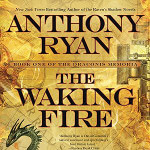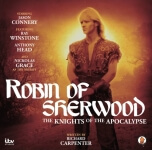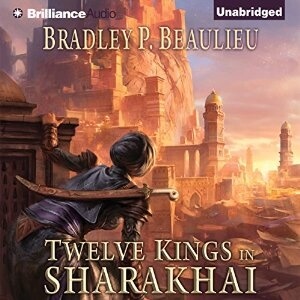
 The Dragonbone Chair (Memory, Sorrow, & Thorn #1)
The Dragonbone Chair (Memory, Sorrow, & Thorn #1)
By Tad Williams; Narrated by Andrew Wincott
Publisher: Penguin Audio
Publication Date: 5 July 2016
[UNABRIDGED] – 33 hours, 19 minutes
Themes: / fantasy / sorcery /
Publisher summary:
A war fueled by the dark powers of sorcery is about to engulf the peaceful land of Osten Ard – for Prester John, the High King, slayer of the dread dragon Shurakai, lies dying. And with his death, an ancient evil will at last be unleashed, as the Storm King, undead ruler of the elvishlike Siti, seeks to regain his lost realm through a pact with one of human royal blood. Then, driven by spell-inspired jealousy and hate, prince will fight prince, while around them the very land begins to die.
Only a small scattered group, the League of the Scroll, recognizes the true danger awaiting Osten Ard. And to Simon – a castle scullion unknowingly apprenticed to a member of this League – will go the task of spearheading the quest for the solution to a riddle of long-lost swords of power…and a quest that will see him fleeing and facing enemies straight out of a legend maker’s worst nightmares!
Review:
This is the first book in a trilogy from Tad Williams. The story was originally published in the late 1980’s, and it’s good to finally have it available in audio. The audio is likely coming in advance of a new trilogy from Williams, a sequel to the Memory, Sorrow, and Thorn trilogy that this book is the first in.
The book is set in Williams’ world of Osten Ard, and from what I can tell (based on the names and words used in the book), Osten Ard is a Nordic country/world. This first book, The Dragonbone Chair, is a sort of coming of age tale for main character Simon, as he struggles to survive in a world that’s rapidly changing.
The main story arc is familiar to those who read a lot of fantasy, or those familiar with Joseph Campbell’s writings on mythology. In the first part of the book, the reader (listener, in my case) is introduced to the world of Osten Ard, specifically Hayholt Castle, where Simon is born and raised. His father is mysterious and his mother died in childbirth, Simon works as part of the serving staff in the castle under King John Presbyter. As a teenager, Simon begins to take instruction from the wizard Morganes, and through this lens the reader learns a lot of the history of the world.
When the king dies, though, and his eldest son Elias takes over ruling the land, the world seems to turn. There is a drought and plague, and the roads no longer seem safe. Some blame this on Elias’ advisor, the red priest Pyrates. Elias’ brother, Josua, is one of those, and escapes the Hayholt to head north to gather troops to take on Josua. Morganes and Simon help Josua escape, and Morganes dies in punishment from Elias, allowing Simon to escape into the world to try to join Josua. Thus begins Simon’s adventure and growth into a man as he struggles to survive in a very difficult time in the world of Osten Ard.
On his travels, he meets a troll, Binabik, and accidentally saves a “Sithi,” one of the old race from the north of Osten Ard. Binabik becomes his traveling companion and they make their way to Josua. When they arrive, an old priest reveals that the terrors being wrought upon the world are the work of the spirt of Ineleuki, a terrible magician from 500 years prior. The northerners fear that the end of the world is near if they cannot stop this black magic. Here, the reader learns about three swords that, united, may be able to turn the tide. One sword, Sorrow, is in Elias’ posession. Another, Minneyar (Memory?), is lost, and the third, Thorn, is believed to be even farther north in the land of what remains of the Sithi and the trolls (two different races). Simon begins a second quest, along with Binabik and some men from Josua’s court, to find this third sword, while evil remains in the world and Elias mounts an attack on Josua.
The story, while familiar, is engrossing. Having read some of Williams’ other works, I’ve found that there are times that they can feel a little plodding, a little drawn out. The Dragonbone Chair never felt this way. Scenes move swiftly and there is always action. Fighting scenes kept me on the edge of my seat and nervous for what would happen next. I also enjoyed looking for parallels in this work to others, such as the tales of King Arthur, as well as trying to piece together what would be next in store for the heroes, just as they were piecing it together.
Unfortunately, the combination of the narrator’s accent and the “odd” names/places in the book made it difficult to understand at times, while listening. Sometimes, too, the narrator at times overdid the accent and/or spoke quietly (because the character was speaking quietly). I was glad that I had the physical book (a copy I’d picked up a few years ago in a book exchange) to refer to and keep track of what was being said. I think that when I listen to the next book in the series, I’ll purchase the ebook to follow along, as needed. I think Wincott did a great job with the narration, even if it was difficult to understand at times. His voice reminds me of some of the British narrators who sound a little bit like someone’s grandfather, reading a story aloud.
Despite the difficult place and character names, and even if some of the fantasy arc was “typical,” I really enjoyed this story, this introduction to the weird world of Osten Ard. I can’t wait for the next book to be released in audio.
Posted by terpkristin.kristin

 Reading, Short And Deep #040
Reading, Short And Deep #040 The Waking Fire (The Draconis Memoira, Book 1)
The Waking Fire (The Draconis Memoira, Book 1)
